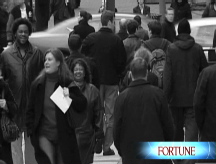It's always the economy, stupid
Recessions ruined the re-election bids of Carter and Bush. Could a weak economy hurt John McCain's chance of keeping the White House in GOP hands?
 |
| Rising unemployment in key electoral battleground states are one factor working against Republican John McCain, according to experts. |
NEW YORK (CNNMoney.com) -- Some of the worst economic conditions in the country are where John McCain can least afford them - in electoral battleground states crucial to Republicans' chances of hanging onto the White House.
Florida, Nevada, Georgia, Tennessee and Colorado - states where President Bush won the electoral vote in 2000 and 2004 - have seen their unemployment rate jump substantially the past 12 months, according to the latest readings from the Labor Department.
Numerous studies by political scientists point to economic woes as among the worst possible drags on the chances for an incumbent party's nominee in presidential elections.
"If there is a relationship which is understood and documented over and over and over again, it's the relationship between the state of the economy and people's decision on whether to vote for the incumbent party or whether to throw the rascals out," said Steven Rosenstone, a University of Minnesota political science professor.
Rosenstone said studies point to drops in inflation-adjusted household disposable income as the clearest indicator of trouble for the incumbent's party. And rising unemployment rates are a key drag on income.
So as Barack Obama moves closer to wrapping up the Democratic presidential nomination with primaries in Oregon and Kentucky Tuesday, some think economic woes in the battleground states could lead to a repeat of what happened in 1980 and 1992.
In both of those elections, a weak economy was a big reason why the incumbent president lost.
Other states that have tended to be Republican strongholds lately are also experiencing economic problems.
For example, Ohio has the highest home foreclosure in the nation, according to the Mortgage Bankers Association, and the nation's tenth worst unemployment rate. Ohio voted for Bush in 2000 and 2004.
Mark Zandi, the chief economist at Moody's Economy.com and an economic advisor to the McCain campaign, concedes that this could be a problem for McCain, the presumptive Republican nominee.
"A number of battleground states are in recession," said Zandi, referring to Florida, Ohio and Nevada specifically.
This is significant since President Bush would have lost in 2000 or 2004 if he lost either Ohio or Florida. Some smaller states now in recession, such as Nevada, could also have tipped the 2000 outcome.
To be sure, the general election campaign is just getting underway. The outcome may very well hinge on which candidate convinces voters that they have the best plan to get the economy back on track.
And Obama has had trouble connecting with lower income voters that are facing the greatest hardships during this economic downturn.
"What [Obama] has to work on is an economic message that resonates," said Henry Brady, a political science professor at the University of California-Berkeley.
Still, the weakening economies in key states are not the only headwinds that McCain will have to face. Declining home values and record high gasoline prices nationwide could hurt McCain if voters blame the Republican Party for the current state of the economy.
"Gasoline at $4 a gallon is just horrific as a reminder everyday when people have to get gas. The housing problem is not going away any time soon. And then you have the job losses," said Brady.
And Rosenstone added that voters generally decide who to vote for based on how the economy has done in the year leading up to the election.
The national unemployment rate is currently 5%. While that's lower than the 5.4% rate in late 2004, it's important to note that unemployment was down from a high of 6.3% in June of 2003. And in key states like Florida, the unemployment rate was falling even faster.
For this reason, Jeff DeSimone, an economics professor at the University of Texas said that he thinks it was an improving economy that was the key to Bush's re-election - not the war, terrorism and so-called "values" issues like gay marriage as many believe.
And since the electoral vote, not the popular vote, determines who wins the White House, DeSimone said McCain could be in trouble if the economy doesn't start to pick up in key states like Florida.
"Given the way our president is elected, it's important that this is concentrated in certain key states," he said.
Zandi points out, however, that McCain may not suffer as much as a typical incumbent candidate would during economic weakness since he is neither a sitting president nor vice president.
But political scientists who have studied both presidential and congressional elections say that voters don't limit their wrath to the sitting president or vice president when the economy turns bad - all members of the president's party suffer.
"Candidates are painted with the brush of their party," said Rosenstone. "If people are sitting here in November and saying the economy is a lot worse than it used to be, that is going to be a problem for McCain, even if he didn't enact the policies that led to the downturn."
Most economists are forecasting a better economy in the second half of this year. But that could still be too little too late for McCain.
Experts point out that President George H.W. Bush, lost the 1992 election even though the economy had started to rebound by Election Day. The same was true in 1980 when President Jimmy Carter lost.
What's more, many economists, including Zandi, expect unemployment to keep rising this year as well.
"Even if there is some technical evidence of the economy rebounding, it's not going to be very helpful to John McCain or very evident to the average person," said Brady. ![]()




